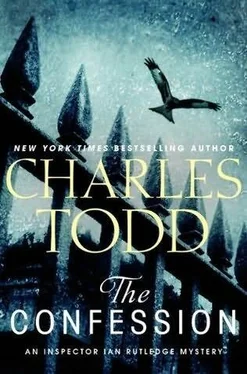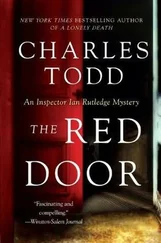Charles Todd - The Confession
Здесь есть возможность читать онлайн «Charles Todd - The Confession» весь текст электронной книги совершенно бесплатно (целиком полную версию без сокращений). В некоторых случаях можно слушать аудио, скачать через торрент в формате fb2 и присутствует краткое содержание. Жанр: Полицейский детектив, на английском языке. Описание произведения, (предисловие) а так же отзывы посетителей доступны на портале библиотеки ЛибКат.
- Название:The Confession
- Автор:
- Жанр:
- Год:неизвестен
- ISBN:нет данных
- Рейтинг книги:5 / 5. Голосов: 1
-
Избранное:Добавить в избранное
- Отзывы:
-
Ваша оценка:
- 100
- 1
- 2
- 3
- 4
- 5
The Confession: краткое содержание, описание и аннотация
Предлагаем к чтению аннотацию, описание, краткое содержание или предисловие (зависит от того, что написал сам автор книги «The Confession»). Если вы не нашли необходимую информацию о книге — напишите в комментариях, мы постараемся отыскать её.
The Confession — читать онлайн бесплатно полную книгу (весь текст) целиком
Ниже представлен текст книги, разбитый по страницам. Система сохранения места последней прочитанной страницы, позволяет с удобством читать онлайн бесплатно книгу «The Confession», без необходимости каждый раз заново искать на чём Вы остановились. Поставьте закладку, и сможете в любой момент перейти на страницу, на которой закончили чтение.
Интервал:
Закладка:
Hamish said, “Speak to a woman.”
But Rutledge was reluctant to show the photograph to a woman. He’d done so with Mrs. Brothers because she knew the household at River’s Edge and could tell him if she recognized the face.
He had reached the end of the High Street, where the bend in the road turned slightly north toward the farms. Looking back the way he had come, he decided to try the pub. It was on the river side of the street, just before the small harbor cut into the reedy land.
He hadn’t chosen to go there first, unwilling to spread word about his search. He knew very well that the men he’d already spoken to might gossip, but he had a feeling they wouldn’t. In a pub, where men gossiped as freely as members of the Women’s Institute, rumor would fly after he’d gone, and he preferred to watch reactions for himself. Still, he needed to find a name, and Chief Superintendent Bowles would be expecting him to produce it when he’d returned to London. And Bowles didn’t care for excuses, however valid. The pub was named-not surprisingly-The Rowing Boat. And the sign above the door, swinging in the light breeze, showed three men pulling for the open sea in their small vessel, backs bent to the oars.
Rutledge stepped inside. In the dim interior, he could see two men playing cribbage at one table. Another man sat hunched over a corner table, eating a thick sandwich and drinking what appeared to be cider. The windows at the far end of the room looked out over the river, and stairs to one side must lead, he thought, down to a cellar and possibly the water as well.
Behind the bar, with its gleaming brass, the wood polished from age and generations of elbows, stood a very tall, thin man with receding gray hair. He straightened when he saw that the newcomer wasn’t a regular, and he watched Rutledge stride toward him without a word of welcome. His eyes gave away nothing, but there was a tightening in the muscles around his mouth.
His first words were, “Police, are you?” The men at the two tables turned to stare.
“My name is Rutledge,” he began without further identification, and as he passed the photograph across the bar, he repeated what he’d said before, that he was searching for the man’s family.
“Coming into money, are they?” the man asked.
“I won’t know until I succeed in finding them.”
“How did he die, then?”
“He was found in the river.”
The barkeep’s eyebrows rose, his first sign of interest. “In the Hawking?”
“Nearby,” Rutledge replied. After all, the Thames passed Tilbury. That, in terms of distances in this part of Essex, could be called nearby.
“Never seen him before,” the man said finally.
“How long have you been barkeep here?”
The question was met with silence.
“My guess is a good ten years,” Rutledge continued. “I’m told the dead man once lived here in Furnham. I should think you’d know your custom by face if not by name.”
“I have a very poor memory,” the barkeep answered him, and lifting his voice, he asked, “You there, at the corner table.”
The man had gone back to his sandwich and now looked up, his craggy brows lifted in surprise at being addressed.
“Have I ever called you by name?”
The man at the table hesitated.
“Well, have I?”
“No. Never,” the man responded at last, taking his cue from the barkeep’s tone of voice.
“There, you see?” he said to Rutledge. “And do I remember,” he went on, to the cribbage players, “do I remember your favorite beverage when you come in?”
They shook their heads, eyes wary as they stared from Rutledge to the publican and back again.
“Sorry I can’t be of help, Mr. Rutledge or whoever you are. But there it is.”
Rutledge said, “Then how could you tell that I was a stranger?”
That caught the man off guard just as he was beginning to grin at his own cleverness.
“You’d have asked what I’d have. Instead you identified me as a policeman.”
The barkeep pushed the photograph back across the bar.
“No one here can help you,” he retorted. “You’d be better off looking elsewhere, if you take my meaning.”
“Scotland Yard doesn’t take kindly to threats. I’ll have you closed down within the day.”
“On what charges?” the man demanded.
“The bar is greasy with spilled beer. The plates you’ve used to serve those men have leftover food clinging to them. And this floor is so filthy I should think a meal here would send a healthy man to his grave. The Chief Constable will be glad to know of these conditions. And as he isn’t likely to trouble himself to travel all the way to Furnham, he’ll take my word for what I’ve seen.”
“It’s all a lie. You wouldn’t dare-”
“Try me,” Rutledge said, his voice cold. And he turned toward the door, ignoring the barkeep, who was shouting abuse after him.
Rutledge had almost reached the door, his back to the bar, when Hamish said, “ ’Ware!”
He turned in time to see the man coming toward him, the heavy wooden club usually kept behind the bar raised in one hand. Rutledge had expected no less.
“Put that down, you fool. Killing me won’t stop the Yard, and you know it.”
The barkeep hesitated, a flash of uncertainty in his eyes. And then it was gone, and his intent was clear-he would finish what he’d begun.
In the next instant he was bent back over the bar, the club across his throat, and Rutledge was saying through clenched teeth as he put pressure on the length of wood, “If anyone else in this room moves, I’ll break his damned neck.”
There was a scraping of chair legs against the floor as the other patrons hastily sat down.
“Now,” Rutledge said to the red-faced barkeep struggling to breathe, “I will step back, and you will sit down in the nearest chair and conduct yourself with decorum. Do you understand me?”
The man could barely move, but he signaled with his eyes that he understood.
Still holding the club, Rutledge released him, and the man nearly sank to his knees. Catching himself with one arm across the bar, he stood there for a moment, fighting for breath, and then he moved to the nearest chair, sinking into it.
He glared at Rutledge, but the fight had gone out of him.
Rutledge said, “What was worth an attack on me? This photograph? What’s your name? And don’t tell me you can’t remember.”
“Barber. Sandy Barber.”
“Who is this man in the photograph?”
He waited, and after a moment the barkeep said hoarsely, “It’s Willet’s son. The old man’s youngest boy.”
“Who is Willet?”
“Ned Willet. He’s a fisherman. It will kill him, seeing his boy dead.”
“And who is his boy, when he’s at home?”
“That’s it, he hasn’t been home since before the end of the war. He’s in service in Thetford-Ben never wanted to be a fisherman, you see. Abigail sent for him as soon as Ned took a bad turn. But Ben never answered. Well-now we know why, don’t we? Look, he’s not got long to live, Ned hasn’t. Let him think his boy can’t leave his post.”
“Why doesn’t Willet have long to live?” Rutledge asked, thinking about Ben Willet’s stomach cancer.
“He got hurt bringing his boat back in a storm. Gear shifted and pinned his foot. It turned septic. They wanted to take his foot off and he wouldn’t hear of it. Stubborn old fool. Now there’s gangrene, and it’s only a matter of time before it takes him. You should see his leg-nearly black it’s that purple, and so swollen it doesn’t look like part of his body.” Gesturing with his chin toward the envelope Rutledge had dropped on the bar, he added, “What happened to Ben, then? You said he came out of the river.”
Читать дальшеИнтервал:
Закладка:
Похожие книги на «The Confession»
Представляем Вашему вниманию похожие книги на «The Confession» списком для выбора. Мы отобрали схожую по названию и смыслу литературу в надежде предоставить читателям больше вариантов отыскать новые, интересные, ещё непрочитанные произведения.
Обсуждение, отзывы о книге «The Confession» и просто собственные мнения читателей. Оставьте ваши комментарии, напишите, что Вы думаете о произведении, его смысле или главных героях. Укажите что конкретно понравилось, а что нет, и почему Вы так считаете.












